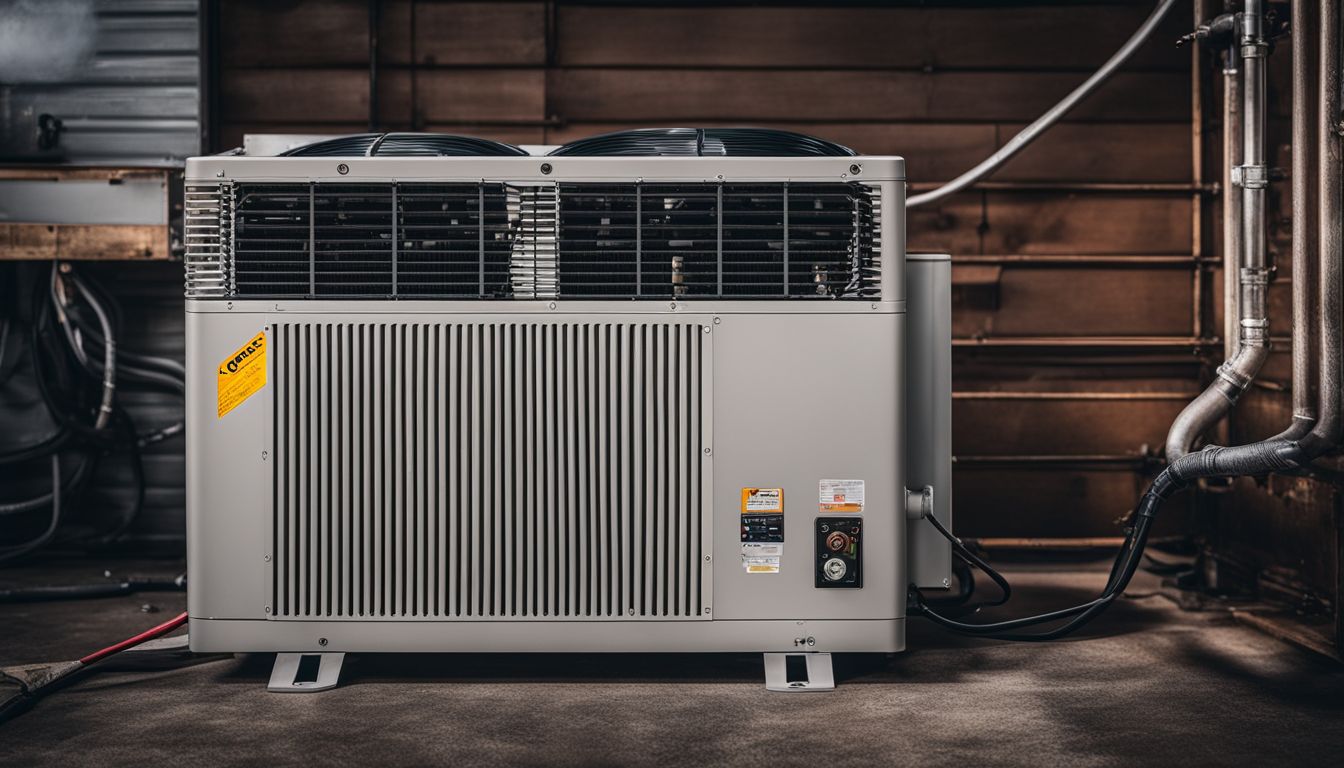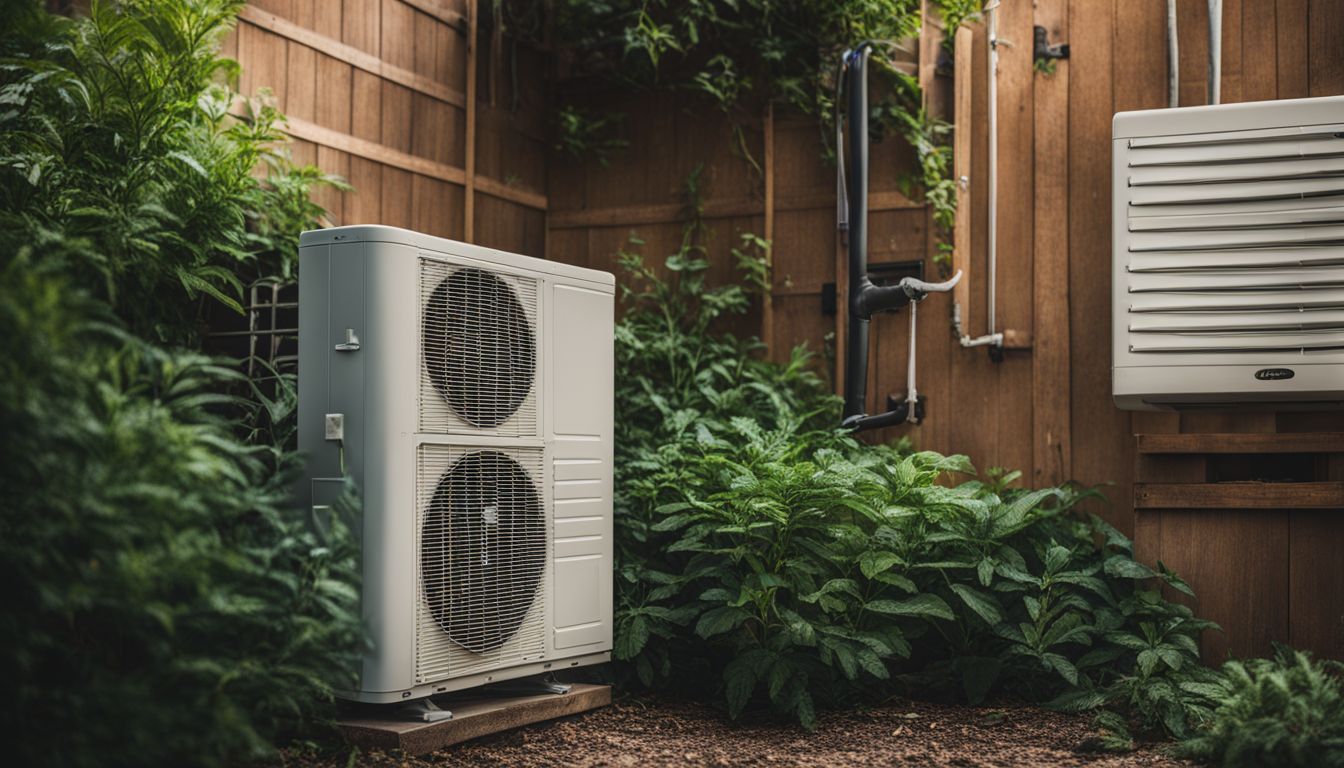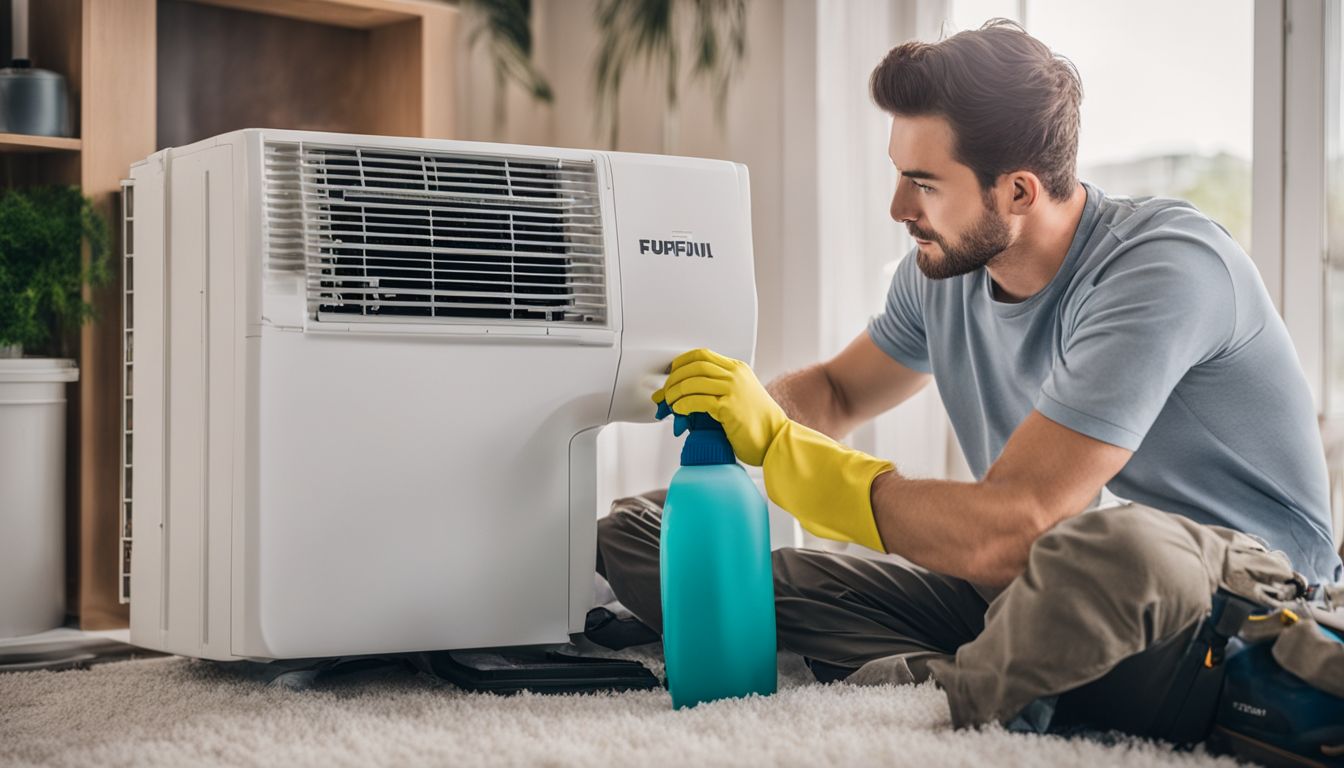Your air conditioner’s health is vital for staying cool and comfortable. A tell-tale sign of trouble is a struggling AC compressor, which is crucial in keeping your home chilled. Our guide will arm you with the knowledge to spot early warnings of failure, saving you time and money.
Keep reading – there’s fresh air ahead!
Understanding the Role of an AC Compressor

An AC compressor is the heart of an air conditioning system; it pumps refrigerant throughout the unit. This vital component compresses the refrigerant from a low-pressure gas to a high-pressure liquid, which then travels through condenser coils where it loses heat and transforms into a cooler liquid form.
Next, this cooled refrigerant circulates through expansion valves and evaporator coils, absorbing heat from your home’s air and creating that refreshing blast of cold air.
The compressor must be in good working condition for any HVAC system to function efficiently. It ensures proper airflow by managing refrigeration cycles effectively. Over time, wear and tear or lack of maintenance can lead to compressor failure, resulting in reduced cooling power or complete shutdowns of the air conditioning unit.
To keep your living space comfortable even during hot weather, this equipment demands regular attention and care by either homeowners themselves or certified HVAC professionals.
Common Signs of AC Compressor Problems
Detecting an AC compressor failure early can save you from sweltering discomfort and hefty repair bills. Keep your ears and eyes alert for unusual symptoms that could signal trouble within your air conditioning system, ensuring it continues pumping cool relief efficiently.
Strange Noises From the Unit
If your air conditioner starts making unusual sounds, it’s time to pay attention. These strange noises could be signalling that the AC compressor is experiencing trouble. Grinding, popping, or screeching sounds are particularly worrisome and often point to the compressor struggling to maintain its function.
The normally quiet operation of the compressor means any persistent noise is definitely out of the ordinary and should prompt a closer look.
Loose parts within the HVAC unit might cause rattling or banging sounds while buzzing or clicking can suggest an electrical issue with relays or contactors. A growling noise might indicate severe problems like a refrigerant leak or compressor overheating – both requiring immediate attention.
Neglecting these warning signs could lead to further damage and more costly repairs down the line for components such as condensing units, suction lines or even other related parts in heating, ventilation, and air conditioning systems.
Leaking Fluid Around the AC Unit
Spotting a pool of fluid around your AC unit is a red flag that shouldn’t be ignored. This leakage could signal that the air conditioning compressor is on the brink of failure. The precious lubricant within the system might be escaping, indicating severe wear or damage to internal parts.
Components grind against each other without this crucial lubrication, escalating the risk of breakage and subsequent leaks.
Exposure to leaking refrigerant isn’t just bad news for your air conditioner; it poses health risks too with symptoms such as headaches and coughing. Prompt action in addressing any signs of liquid around the AC unit can prevent further damage not only to the machine but also safeguard your well-being from exposure to harmful substances.
Keep an eye out for damp spots or oil stains near your air conditioning units – they’re telltale signs that something’s amiss inside your cooling system.
Reduction in Airflow and Warmer Air
If your air conditioner starts blowing out less air than usual, take notice; it might be signalling trouble with the AC compressor. This reduced airflow can sneak up on you because the system often continues to blow some amount of air—even if it’s not enough to cool your space effectively.
A healthy compressor pumps cool, refreshing air into your home, so any change in this pattern requires attention.
Feeling warm air coming from your vents is another red flag that shouldn’t be ignored. It could mean that the compressor isn’t adequately compressing the refrigerant needed for heat exchange, or there’s a blockage in the refrigerant line.
Both issues prevent your AC from doing its job: keeping you cool by maintaining a consistent flow of chilled air through your ducts and rooms. Keep an eye on these symptoms as they are tell-tale signs that something is amiss with your cooling system, possibly pointing towards impending compressor failure.
Frequent Circuit Breaker Trips
Frequent circuit breaker trips might signal trouble with your air conditioner’s compressor. The compressor could be drawing too much power, causing it to overheat and trip the breaker.
This is not only a nuisance but also an alert that something within the system is functioning incorrectly. Look out for dirty filters or malfunctions in the circuit box as potential causes of these trips.
To prevent such incidents, regular cleaning of air filters and checks on other AC components are necessary preventive measures. A surge protector can also safeguard against unexpected power surges that might prompt the circuit breaker to trip.
Addressing these issues swiftly ensures your AC runs smoothly without putting undue stress on its electrical components.
Higher than Usual Electricity Bills
If your electricity bills suddenly shoot up, this might signal a problem with the air conditioning compressor. A malfunctioning compressor forces the AC system to work harder and less efficiently, gulping down more energy to keep your home cool.
This inefficiency often goes unnoticed until you see a spike in your monthly expenses.
Checking for issues with your unit early on could save you from unexpectedly high costs. The AC’s compressor not turning on correctly or struggling to maintain pressure can drastically affect how much power it uses.
If you suspect something is off, having a technician inspect your system could prevent those startlingly high charges before they become routine on your bill.
Proactive Measures for Preventing Common Aircon Issues
Regular maintenance is the key to avoiding common aircon issues, specifically AC compressors. Scheduling professional services to inspect and service your air conditioning compressor can significantly reduce the risk of breakdowns.
During these check-ups, technicians clean filters and check for blockages in the system that could impede airflow. They also ensure that refrigerant levels are correct; low levels often indicate leaks or an underperforming compressor.
Replace worn parts like capacitors and fuses promptly since they play a crucial role in the efficient operation of an AC unit. Use surge protectors to shield your air conditioning system from voltage spikes, which can damage electrical components over time.
Consistently monitor cooling performance and be alert for any signs of strain on your unit such as unusual noises or leaking fluids around your AC unit – early detection can save you from costly repairs down the line.
Keep surrounding areas clear from debris to prevent clogs in external units, helping maintain optimal function of evaporated heat flows through condenser coils and proper ventilation through air ducts.
How to Troubleshoot Air Compressor Issues
Discover the steps you can take to effectively pinpoint problems with your air conditioner’s compressor, ensuring it runs smoothly and efficiently – continue reading for practical troubleshooting tips.
Playing with the Thermostat
Constantly adjusting the thermostat can signal trouble with your air conditioning system. If you often find yourself turning it down because the air isn’t cool enough, or up because there’s no need for such intense cooling, this could point to an AC compressor that’s not performing as it should.
The sensor in your home’s A/C system is designed to measure temperature over the evaporator coil but if it fails, you may feel compelled to keep tweaking the thermostat settings.
Repeatedly playing with the thermostat instead of maintaining a steady temperature suggests something might be amiss. Check whether your unit is blowing warm air; this is a classic symptom of low refrigerant levels or a leak, indicating possible compressor failure.
Ignoring these adjustments could lead to further damage and more expensive repairs down the line. Regular inspections can help catch early signs like these before they escalate into bigger issues affecting your ACS performance and efficiency.
Checking the Circuit Box
Head over to your fuse box as soon as you notice any signs of trouble with your air conditioning compressor. A tripped circuit breaker often signals problems in the system. Inspect each breaker carefully and look for any that have moved to the off position.
If you find one, it could be that an overload or electrical fault within the compressor has caused it to trip.
Resetting a tripped circuit breaker is straightforward: turn it back to its on position firmly but gently. Keep an eye on whether it trips again after resetting because this could indicate more serious issues with your air conditioner’s electrical components.
Regular checks of the circuit box will help catch these faults early, potentially saving energy and money by preventing damage to other parts of the cooling system like refrigerators, furnaces or heat pumps.
Investigating for Blockages
To determine if blockages are causing your AC compressor issues, begin by inspecting the outdoor unit. Look for any debris that might be clogging up the condenser coils. Leaves, dirt, and even trash can accumulate around them, restricting airflow and leading to overheating.
Clear away all obstructions carefully to allow your system to breathe easier.
Next, check the indoor vents for anything impeding air circulation—from furniture placed close to a vent to dust buildup within ducts. Ensure filters are clean and replace them regularly; dirty filters not only reduce efficiency but could also contribute to compressors working harder than necessary.
A clear path for air is crucial in making sure your air conditioning compressor doesn’t falter under strain.
The Impact of a Failing AC Compressor on Energy Bills
Your air conditioning compressor is like the heart of your cooling system; if it starts to fail, it has to work a lot harder. This extra effort requires more electricity, which means your energy bills will start climbing.
Think of this part as the engine that pumps refrigerant throughout your unit – when it isn’t running smoothly, everything else struggles.
Electrical problems often hit compressors hard. If they receive too much or too little voltage, damage can occur rapidly. Not only does this harm the compressor itself, but it also forces your AC to use more power in an attempt to compensate for its poor performance.
The outcome? Heftier costs on your energy bill every month due to inefficiency and strain on the system.
Conclusion

Knowing the signs of AC compressor trouble saves time and money. Act quickly if you hear odd noises or see leaks near your unit. Regular checks keep cooling systems running smoothly.
Spotting issues early often means simpler, less costly fixes. Always prioritise maintenance to ensure your air conditioner’s longevity.
Discover more about maintaining optimal performance and sidestepping disturbances with your air conditioning unit by exploring our guide to proactive measures for preventing common aircon issues.
FAQs
1. What are the main signs that an air conditioning compressor is failing?
Look for symptoms like strange noises from the air conditioner, circuit breakers tripping often, or the unit struggling to maintain a liquid state in the refrigerant.
2. Could an oil pump problem indicate my AC compressor is about to fail?
Yes, if your air conditioner’s oil pump isn’t working right, it might cause damage to your AC compressor over time.
3. How does an air conditioning compressor work?
The compressor pumps refrigerant through your air conditioner’s system and turns it from a gas into a liquid state to cool your home efficiently.
4. Why does my AC keep tripping circuit breakers?
If your AC trips circuit breakers repeatedly, this could be a sign of an overloaded or failing compressor needing immediate attention.





